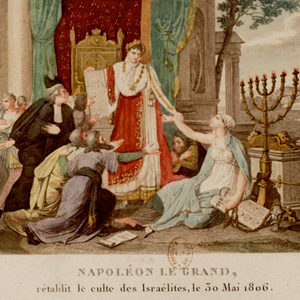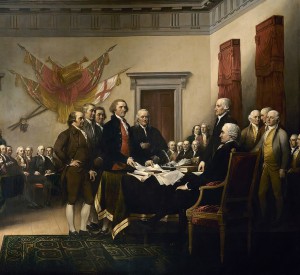Week 1: The Roots of Jewish Modernity
 The modern West, with its emphasis on progress, freedom, and individualism, has created unprecedented opportunities for Jewish flourishing. In America, Jews have had incredible opportunities to succeed as individuals without the hindrances that often held them down in other times and places in the diaspora. And in Israel, Jews have benefited from the ideas and institutions of political liberty in fashioning a modern democratic state and making it prosper as a protective homeland for Jews everywhere.
The modern West, with its emphasis on progress, freedom, and individualism, has created unprecedented opportunities for Jewish flourishing. In America, Jews have had incredible opportunities to succeed as individuals without the hindrances that often held them down in other times and places in the diaspora. And in Israel, Jews have benefited from the ideas and institutions of political liberty in fashioning a modern democratic state and making it prosper as a protective homeland for Jews everywhere.
But the freedom that Jews as individuals have enjoyed has led to novel and difficult challenges – challenges in preserving Jewish identity, in educating a rising generation of Jews about the unique greatness and enduring importance of Jewish civilization, and in negotiating the complexities of a world with two major Jewish centers – Israel and America.
Young people who feel a calling to live a life of Jewish purpose and Jewish leadership need to understand the competing political ideas that have given birth to the modern Jewish condition and how the Jewish situation relates to the greater challenges and choices now facing the democratic West.
The seminars of the first week will be led by the preeminent scholar of modern Jewish thought, Leora Batnitzky (Princeton University) and by the pioneering leader of scholarship in Jewish literature, Ruth Wisse (Harvard University and the Tikvah Fund)
Week 2: Judaism and the Idea of America
 America was seen by its founders as the great experiment that would test the ideas of the enlightenment regarding individual rights, equality, the limits of government power, and the proper place for religion in public life. It was also an expression of a society that was deeply rooted in the Hebrew Bible and eager to implement its political teachings.
America was seen by its founders as the great experiment that would test the ideas of the enlightenment regarding individual rights, equality, the limits of government power, and the proper place for religion in public life. It was also an expression of a society that was deeply rooted in the Hebrew Bible and eager to implement its political teachings.
Led by Samuel Goldman (George Washington University), we will study the distinctive qualities of the Jewish American experience.
How has American exceptionalism has led to American Jewish exceptionalism? What is the nature of freedom in this land of the free? And how does American freedom pose special challenges and opportunities for Jewish Americans? How have the Jews—and more recently the State of Israel—been viewed by gentile America? What explains the outsized role of the Jewish people in the American self-image?
Week 3: The Jewish Strategy Workshop

Israeli schoolchildren hold the Israeli and American flags during a rehearsal for U.S. President Barack Obama’s visit at his Israeli counterpart Shimon Peres’ residence tomorrow, in Jerusalem March 19, 2013. Obama is due to begin his first official visit to Israel and the Palestinian Territories on Wednesday, looking to improve ties after sometimes rocky relations with both sides during his first term in office. REUTER/Baz Ratner (JERUSALEM – Tags: POLITICS) – RTR3F75E
What is the mission of American Jewry? What matters most in American Jewish life today? And does American Jewry have a strategy to confront its problems and fulfill its essential purpose?
These are the questions at the heart of the third week’s seminar, led by Tikvah’s Executive Director, Eric Cohen. Mr. Cohen will lead a debate about these questions in a very concrete way. He will ask the group to imaginatively inhabit the position of a a major Jewish philanthropist, who wishes to invest $20 million per year for the next 20 years in the Jewish people. He will lay out a set of options for the investment, each of which represents a different assessment of how Jewish survival and flourishing can best be promoted.
As a group, the fellows will try to define, through deliberation and debate, an American Jewish strategy for the decades ahead.
